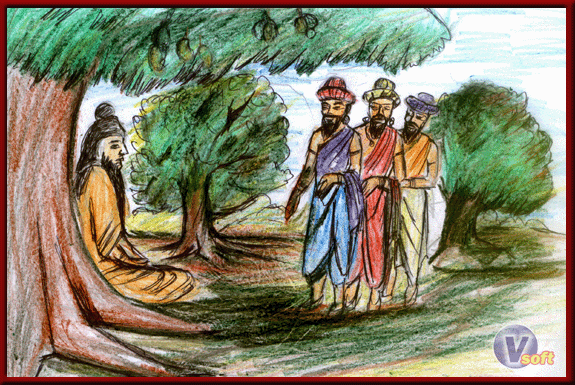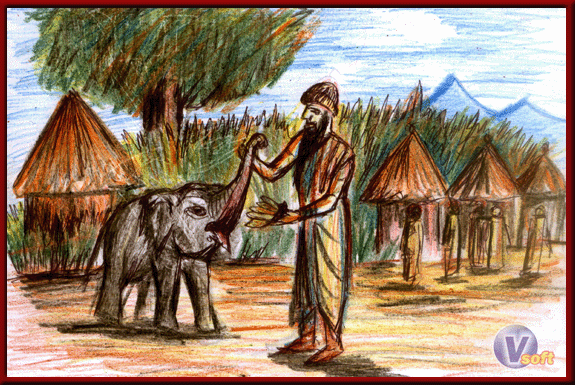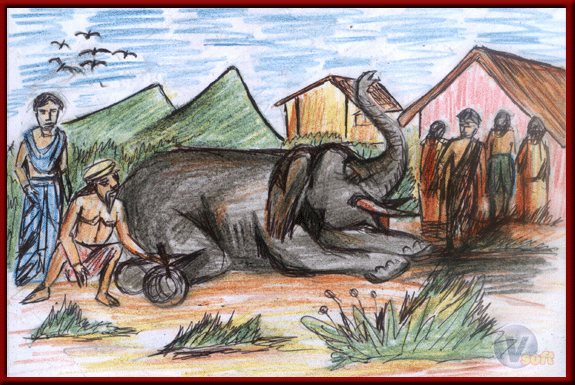Monthly Archives: January 2014
168. The Bodhisatta And The False Ascetic

Once upon a time when Brahmadatta was reigning in Benares, the Bodhisatta became Sakka. At that time a knavish ascetic built a hermitage of leaves in a mango orchard on a river bank near Benares, and keeping watch over the mangoes, ate the ripe fruit that fell from the mango trees and also gave some to his kinsfolk, and lived there gaining his livelihood by various false practices.
At this time Sakka, king of heaven, thought “Who, I wonder, in this world of men support their parents, pay honour to the aged members of their family, give alms, keep the moral law and observe fast days? Which of them after adopting the religious life, continually devote themselves to the duties befitting priests, and which of again are guilty of misconduct?” And exploring the world he spied this false wicked ascetic keeping watch over his mangoes and said, “This false ascetic, abandoning his duties as a priest, is continuosly watching a mango orchard. I will frighten him soundly.”
167. The Bodhidharma And The Fair Trial

Once upon a time when Brahmadatta was reigning in Benares, the Bodhisatta became his lord justice. The king’s chaplain went to a village where he was attacked by headman. The chaplain came and complained about this to the king. When the king heard the priest’s story, he summoned the headman and himself sat in judgment, and without examining into the matter he said, “You have beaten my priest and raised a bump on his forehead,” and ordered all your property to be taken from you. Then said the Bodhisatta to him, “Sir! Without even investigating the matter you passed on the judgement. But some men after inflicting wounds on themselves declare that they have been wounded by another.
166. The Bodhisatta And The Elephant

Once upon a time, while Brahmadatta was king of Benares, the Bodhisatta was born of a brahmin family. On growing up he left his worldly home and took to the religious life, and in time became the leader of a company of five hundred anchorites, who all lived together in the Himalayas.
Amongst these anchorites was a headstrong and unteachable person named Indasamanagotta. He had a pet elephant. The Bodhisatta sent for him when he found this out, and asked if he really did keep a young elephant? Yes, the man said, he had an elephant which had lost its family. The Bodhisatta said, “Well! when elephants grow up they kill even those who foster them; so don’t keep it any longer.” “But I can’t live without him, my Teacher!” was the reply. “Oh, well,” said the Bodhisatta, “you’ll live to repent it.”
165. The Bodhisatta And The Elephant Festival

Once upon a time, king Susima ruled Benares; and the Bodhisatta was came to the worls as the son of his chaplain. The father was Master of the Ceremonies in the king’s elephant festivals. He alone had right to all the trappings and appointments of the elephants which came into the place of festival. By this means he gained as much as ten millions at each festival. When he was sixteen years old, his father died.
At the time of our story the season for an elephant festival came round. And the Brahmins all flocked to the king, with these words. “O great king! The season for an elephant festival has come, and a festival should be made. But chaplain’s son is very young; he knows neither the three Vedas nor the lore of elephants. Shall we conduct the ceremony?” To this the king consented.

